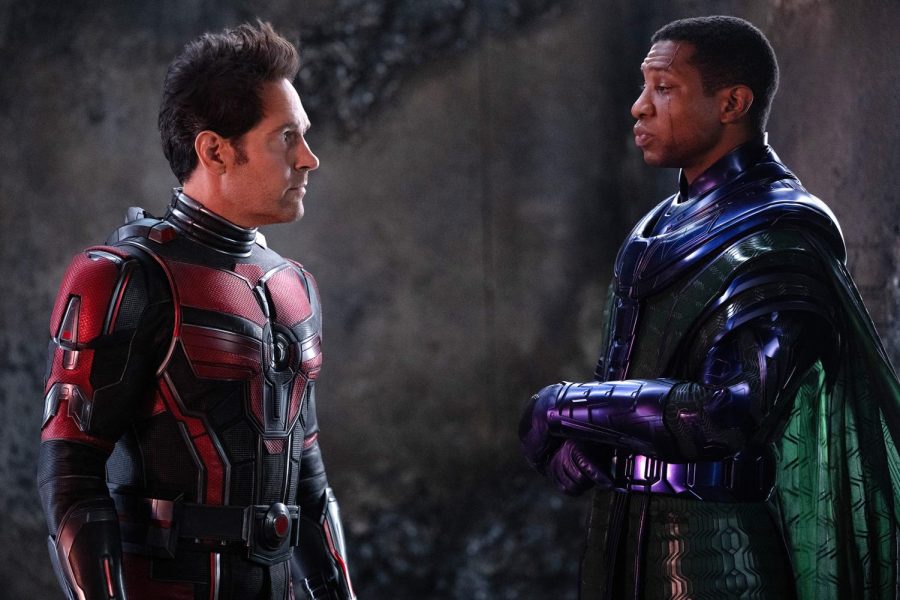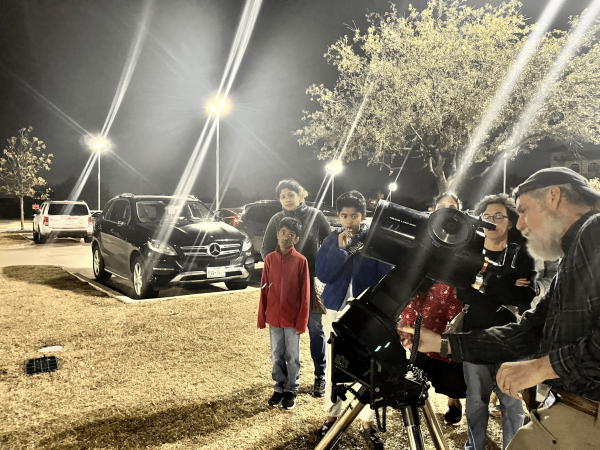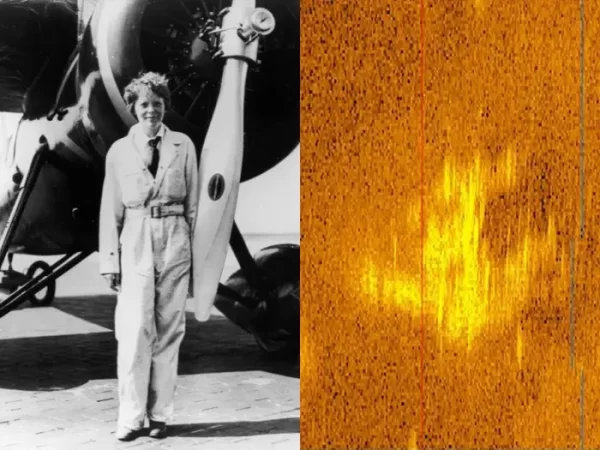Review: ‘Ant-Man and the Wasp: Quantumania’
Phase five of the Marvel Cinematic Universe (MCU) began with ‘Ant-Man and the Wasp: Quantumania’ flying into theaters last weekend.
Though the film manages to be passably entertaining, I feel it has emerged as one of the MCU’s most confounding, dumbfounded, and underwhelming motion pictures, adding to their rapidly expanding list of misfires.
The movie features Scott Lang/Ant-Man (Paul Rudd) attempting to escape the outlandish subatomic world introduced in previous Ant-Man films known as the “quantum realm” while being pursued by a powerful threat: A villain known as Kang the Conqueror (Jonathan Majors).

Along the way, he attempts to reconnect with his teenage daughter Cassie Lang (Cathryn Newton) and reunite with his stranded surrogate family Hope van Dyne/The Wasp (Evangeline Lily) and her parents Hank Pym (Michael Douglass) and Janet van Dyne (Michelle Pfeifer).
In my view, a majority of the film’s weaknesses can be attributed to its screenwriter Jeff Loveness.
Loveness has never worked on a feature film before, let alone one of this scale, with his only prominent experience being for writing a handful of episodes of ‘Rick and Morty’ and ‘Jimmy Kimmel Live’.
The concepts in this film, regarding the multiverse, time travel, and the quantum realm to name a few, are quite similar to those found in ‘Rick and Morty’.
It makes a degree of sense for Loveness to be hired for this reason, but his competence and experience as a screenwriter were simply insufficient to handle the burden of a $200 million Hollywood blockbuster in the world’s biggest film franchise, especially one that is so vital to the greater direction of the interconnected storyline.
Firstly, the movie struggles as a self-contained adventure. It introduces interesting thematic concepts in the beginning but fails to expand on them, and the narrative ends up feeling somewhat pointless as a result.

Moreover, the humor is mostly unfunny and feels forced the majority of the time because, unlike the previous Ant-Man films, this movie is aiming for a more serious tone because of its sheer scope and gravitas.
This is one of the most fundamental issues with the movie. It tells an expansive and grand story, but the Ant-Man franchise may have become too big for its own good. It has lost the unique appeal of the first two films that came with smaller-scale stories that lent themselves to a more lighthearted tone. The trilogy as a whole now lacks cohesion because the third installment abruptly raises the stakes to incomprehensible levels.
The movie does not even feature some of the most memorable characters from the first two films, most notably the comic relief character Luis (Michael Peña).
Furthermore, the dialogue itself is not nearly as sharp as some other MCU films and suffers from unfortunately common MCU tropes. Almost every scene has characters constantly quipping, and it quickly becomes tiring, especially since it severely conflicts with the serious stakes and creates tonal whiplash.
The issues present in the writing result in almost all of the characters being underwritten and underdeveloped.

Scott Lang, though portrayed likably by the charismatic Rudd, undergoes little to no character development. His choices, which would have otherwise been intriguing ethical dilemmas, are shallow and lack depth. The movie plants seeds about the consequences of his newfound celebrity status after being one of the heroes to save the universe in the events of ‘Avengers: Endgame’, but it fails to deliver on the promise of the premise.
His most significant point of conflict revolves around his strained relationship with his 18-year-old daughter Cassie. In the previous Ant-Man films, she was a young girl, but following the events of ‘Avengers: Infinity War’, Scott missed the opportunity to watch her grow up.
Various nuances were established between the two such as her feeling abandoned, adopting a more proactive approach to helping others, and becoming closer to Hank and the Van Dyne’s who fostered her interest in science. However, the movie yet again does nothing with the relationship, which is the emotional core of the Ant-Man series, and it causes it to feel empty.
Cassie herself is an extremely underwritten character. She never works to attain her scientific skills and has already mastered her superpowers of shrinking and growing with no effort or established basis for her abilities.
Despite this, my bigger issue with the Cassie character is her casting. Though Newton does well in the role, she is not the first actress to play the character in the MCU.
She was played by the talented child actress Abby Ryder Fortson in 2015’s ‘Ant-Man’ and 2018’s ‘Ant-Man and the Wasp’, and was then replaced by the teenage actor Emma Furhmann in ‘Avengers: Endgame’ because of the movie’s five-year time jump.

Fuhrmann did well enough during her short screen time in ‘Avengers: Endgame’ to warrant continuing to play the character, but I feel she was needlessly recast.
However, the lead character whom I felt had the most wasted potential was Janet Van Dyne played by veteran actress Michelle Pfeifer. The movie sets up moral complexity in her characterization but does not even attempt to expand on it in any meaningful way.
Her primary role in the movie is to deliver dull expository dialogue to explain her origins with the film’s main antagonist Kang. Not only are these moments uninteresting and a symptom of lackluster writing, but contradictory to the previously established story in the MCU.
The Wasp is one of the movie’s titular characters, and yet she ends up being an unimportant supporting character along with her father Hank, both of whom are completely underutilized and ultimately wasted.
Regardless, the worst character in the film in my opinion is easily Darren Cross a.k.a the Mechanized Organism Designed Only for Killing (M.O.D.O.K).
In his best comic book appearances, M.O.D.O.K is a genius scientist named George Tarleton whose head has been expanded to preposterous size, and becomes a supervillain. He is a balance between humorous and menacing.
In this film, he is instead Darren Cross, the one-dimensional antagonist of the first Ant-Man film, who was initially believed to have been killed in the movie’s final battle.
However, actor Corey Stoll has returned to play Cross, this time as a visually abhorrent CGI character with an uncanny and distracting large head, awful comedic moments, and a laughably rushed arc. He was absolutely unnecessary to the movie and a shameful depiction of the character.

These characters are only the most prominent of a plethora of unimportant side characters with minimal screen time that was ultimately pointless to the greater movie.
Thankfully, one character prevails despite the failings of other characters. The movie’s main antagonist, Kang the Conqueror, is significantly more compelling, but also the film’s most unfortunate missed opportunity.
Kang the Conqueror is being built up by Marvel as the single biggest villain in the MCU, the successor to Thanos in the ongoing storyline that concluded in ‘Avengers: Endgame’ called the Infinity Saga. Likewise, Kang is the villain of the current ongoing narrative called the Multiverse Saga.
In this film and many Marvel comic books, Kang is a time-traveling genocidal conqueror who is set to be the main villain of the next two Avengers films, ‘Avengers: The Kang Dynasty’ and ‘Avengers: Secret Wars’. An alternate version of Kang also played by Majors, known as He Who Remains, was established in the ‘Loki’ series on Disney+.
Majors’ performance is a “tour de force” in acting, making a fantastical character feel grounded and believable. However, the movie’s story fails to build him up as a formidable foe for the MCU’s heroes and fails to adhere to the age-old storytelling adage of “show, don’t tell.”
He is said on multiple occasions to be a force to be reckoned with, but his power is not adequately communicated in the movie. He does almost nothing to demonstrate how serious of a threat he is, and is portrayed as rather incompetent, making some unbelievably contrived and nonsensical decisions in the film.

The movie is also held back by a lack of any serious consequences to the characters, making what should be a colossal epic feel like another small-scale adventure that forgot its previous charms.
Despite the readily apparent narrative flaws, there was still an opportunity for the filmmakers to overcome them and create a great movie. However, the creative team, particularly director Peyton Reed, does not accomplish this.
Peyton Reed directed the previous two Ant-Man films, and is for all practical purposes, a blank slate as a director. His directorial style lacks a distinct creative vision, and it allows the MCU to suffer from all of the problems that frequently plague their movies.
The shots are basic, some cuts created jarring continuity errors, and the overall creative direction of the movie is lackluster. A superior director could have salvaged the film.
One of the movie’s redeeming qualities is the wild and wacky quantum realm, which features some amusing world-building and unique creatures.
The visual aesthetic and color palette of the movie creates some beautiful visuals, but a lot of the visual effects looked unfinished, especially the ones filmed on LED volume stages. This appears to be a symptom of the issue of tight deadlines and poor working conditions in the Hollywood visual effects industry.

The action is also hindered by the setting of the quantum realm. Ant-Man and the Wasp’s abilities to grow and shrink in size are only apparent because of the real-world objects and people they can be compared to. In an entirely fantastical environment created with CGI, the action becomes quite unclear.
The third act final battle in particular aggravated me since, much like the rest of the movie, there was no substance to the spectacle.
Overall, ‘Ant-Man and the Wasp: Quantumania’ is entertaining for the most part but is held back by the numerous issues that often plague the MCU, but in full force and effect, exacerbated by the inability of its screenwriter and director to enhance its strongest elements and reduce its weakest ones.
I once thought the MCU was too big to fail. It became such a well-oiled machine, mastering its formula to consistently create entertaining and well-produced superhero entertainment that took the world by storm. With so much content being produced, and quite a bit of it not living up to expectations, I have had to question that notion, and ‘Ant-Man and the Wasp: Quantumania’ may be the final proof that the MCU has lost its magic.






